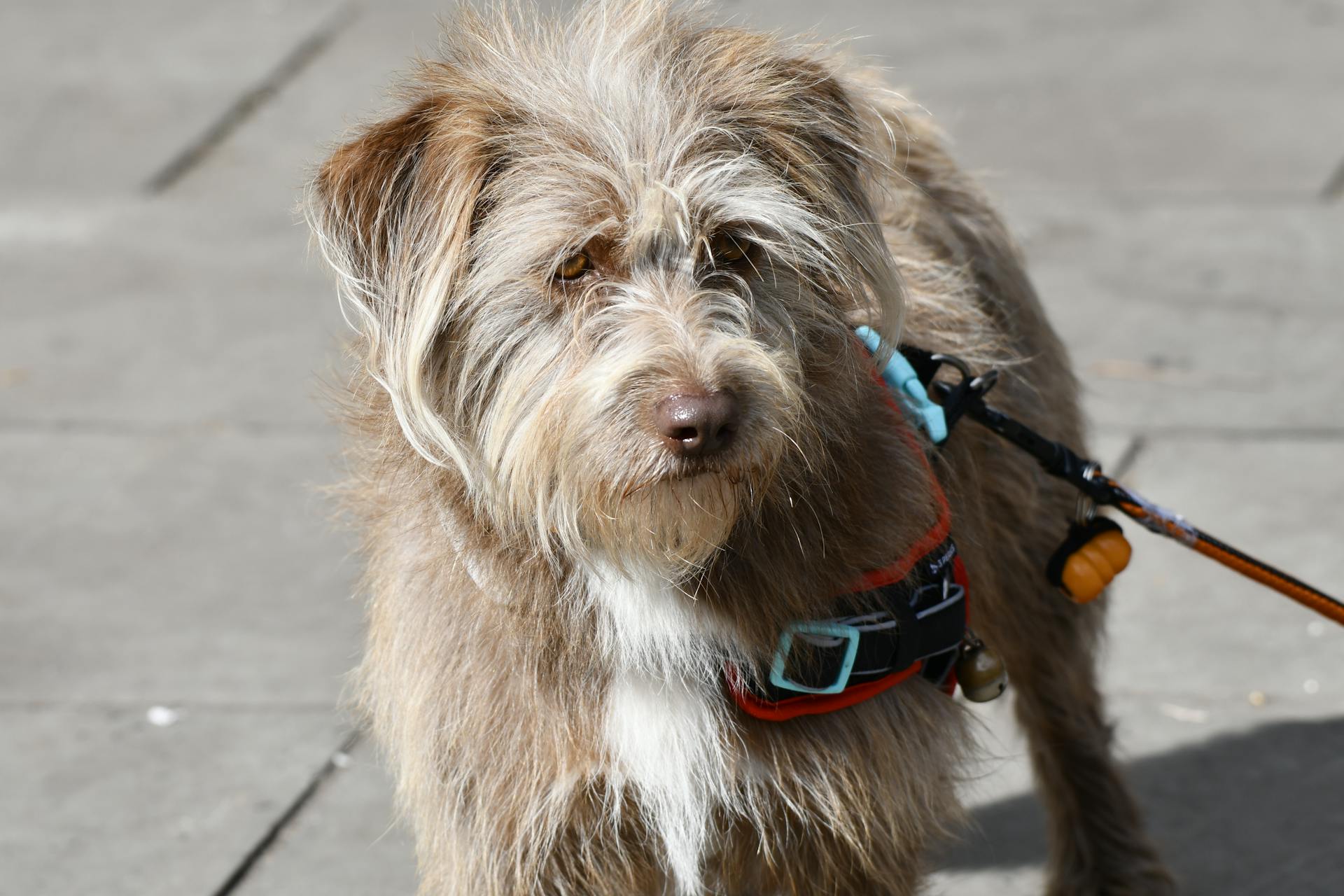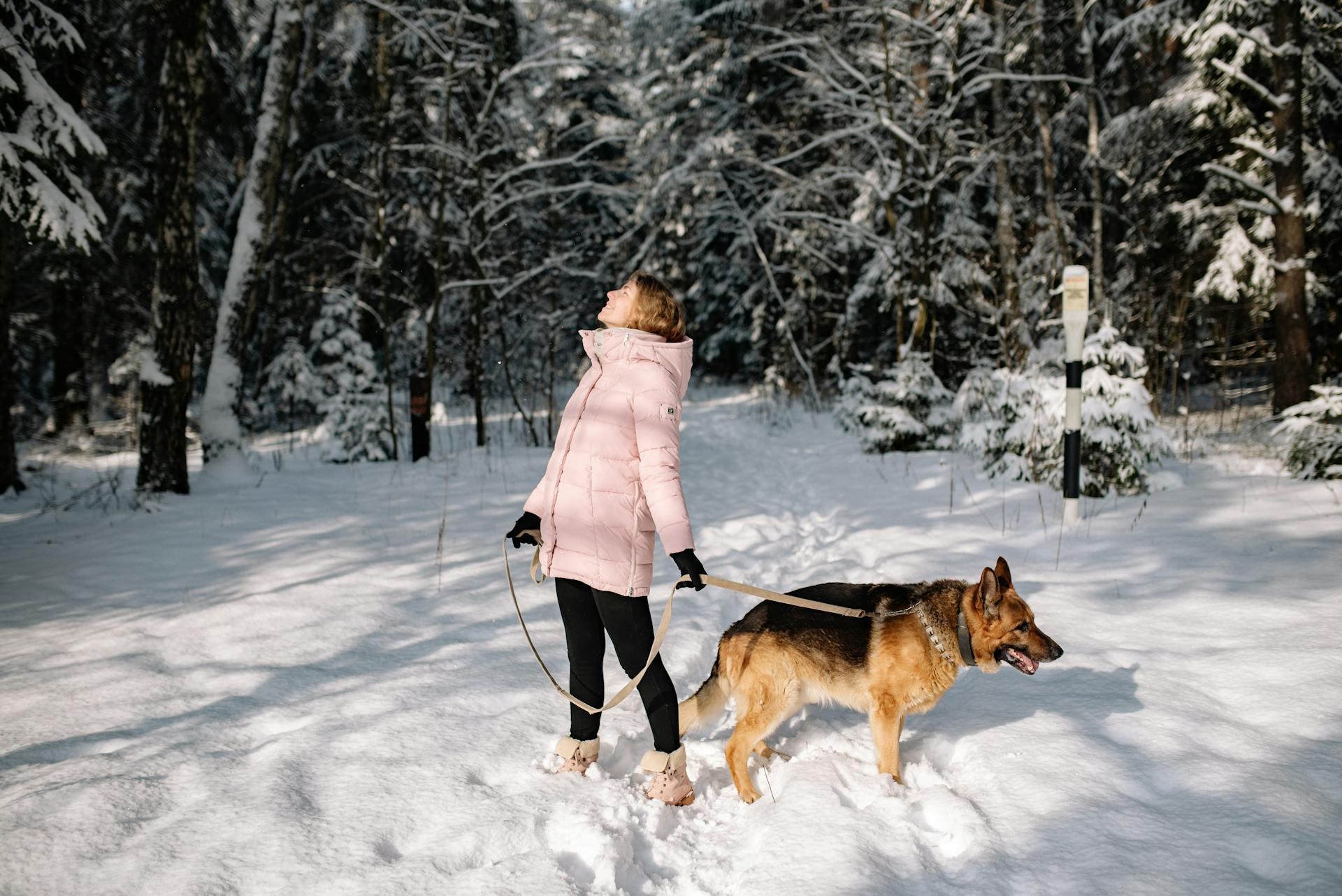
The Dutch Shepherd is a highly intelligent breed that excels at problem-solving and learning quickly.
Their high energy levels require regular exercise to keep them physically and mentally stimulated, with a minimum of 1-2 hours of physical activity per day recommended.
Dutch Shepherds are naturally protective of their family and territory, making them excellent watchdogs, but they also thrive on human interaction and affection.
Characteristics of
Dutch Shepherds are highly intelligent dogs, known for their great temperament and working skills. They can be quite independent, but this doesn't mean they're not affectionate - on the contrary, they form strong attachments with their family.
One of the characteristics that make Dutch Shepherds stand out is their high trainability. With the right introductions, they live well with other dogs and children, too. This makes them a great choice for families who want to include their furry friend in all activities.
Dutch Shepherds have a High Affection Level, Friendliness, Kid-Friendly, Pet-Friendly, Exercise Needs, Energy Level, Trainability, Intelligence, and Tendency to Bark, according to expert sources. Here's a quick rundown of these characteristics:
Dutch Shepherds are also known for their loyalty and reliability. They have a strong character and independence passed down from their herding ancestry, which makes them well-suited for working roles such as police and military work.
If you're thinking of getting a Dutch Shepherd, it's essential to remember that they need regular exercise and mental stimulation to prevent boredom and undesirable behaviors. With the right care and attention, however, these dogs can thrive and become loving companions.
History and Origins
The Dutch Shepherd has a rich history dating back to the 19th century when they were originally developed for their herding skills.
They were highly valued for their all-round capabilities, being used as farm guard dogs and even pulling carts due to their strength. The first breed standard was recognized in 1898, and by the early 20th century, farming became more industrialized, reducing the need for their herding skills.
The Dutch Shepherd's popularity plummeted during World War II when breeding came to a halt, and many dogs perished as a result of the fighting. This near-extinction event was averted thanks to enthusiasts who reestablished breeding programs after the war.
For more insights, see: Cane Corso Roman War Dog
History of the
The Dutch Shepherd has a rich history that dates back to the 19th century when they were developed for their herding skills.
Their all-round capabilities made them invaluable on farms where they would herd livestock, guard against predators, and even pull carts. The first breed standard was recognized in 1898, but it wasn't until 1914 that only brindle coloring was accepted to distinguish them from German and Belgian Shepherd relatives.
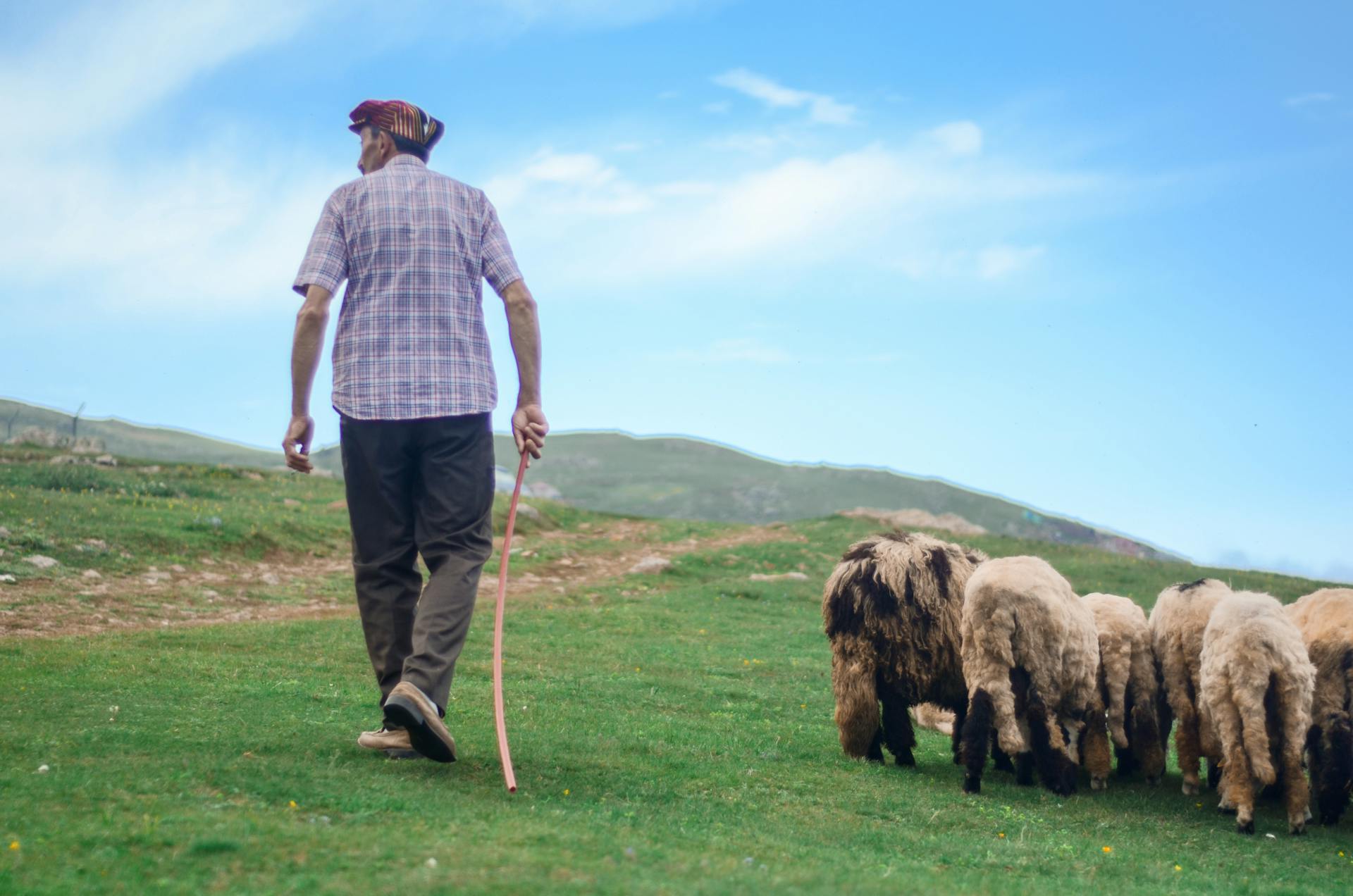
These dogs were originally developed for the high volumes of arable and livestock farming in the Netherlands during this time period. Their strength and versatility made them a sought-after breed among farmers. By the early 20th century, however, modern farming techniques reduced their need, leading to a decline in popularity.
The Dutch Shepherd's skills as farm guard dogs were unmatched, but with the onset of World War II, breeding came to a halt, and many dogs perished. This near-extinction event was only prevented by enthusiasts reestablishing breeding programs after the war. Today, they remain a rare breed, often used for search and rescue, police work, and as assistance dogs.
Their intelligence and vigilant nature make them ideal for high-stress roles like search and rescue, but they also make wonderful family pets when properly trained and socialized.
Check this out: Are Border Collies High Maintenance
European Wild Dogs
The Dutch Shepherd has a wild past that's fascinating to learn about.
In 1910, a dog fancier wrote that the Dutch Shepherd bears a great resemblance to the wolf, highlighting its connection to old European wild dogs.
These ancient dogs were bred from local populations as herders for sheep herds, showcasing their natural ability to herd and work with livestock.
Care and Grooming
To care for a Dutch Shepherd, they thrive in active and stimulating homes where they receive regular grooming.
A Dutch Shepherd is not suited to being left alone for long periods, as problem behaviors can surface if they don't get enough enrichment.
They have three varieties of coats: short and smooth, long-haired, and wire/rough-coated, with the wire-haired variety being scarce.
Take a look at this: Miniature Wire Fox Terrier
Care
Dutch Shepherds thrive in active and stimulating homes where they receive regular grooming.
They are not suited to being left alone for long periods, so you'll need to plan your daily routine accordingly. A Dutch Shepherd's high energy levels require plenty of walks and jogs.
Their fierce intelligence means they will develop their own way of doing things if they don't receive clear training. This can be a fun challenge for experienced dog owners, but it may also lead to problem behaviors if not addressed properly.
The amount of grooming needed depends on the Dutch Shepherd's coat type - shorter coats are generally easier to maintain. With regular walks and jogs, caring for your Dutch Shepherd is relatively easy.
Dutch Shepherd puppies require ample amounts of socialization, training, and activity to keep them focused and set up for long-term success. They can be strong-willed and independent, so it's essential to establish clear boundaries from an early age.
Grooming
The Dutch shepherd's coat is a unique feature that requires some attention. The brindle coat comes in three varieties: short and smooth, long-haired, and wire/rough-coated.
You'll need to groom your Dutch shepherd regularly, especially if you have one of the smooth or long-haired types. Weekly grooming will help remove loose hair and keep their coat and skin in good condition.
During shedding periods in spring and fall, things can get hairy. You may need to use a de-shedding tool like a Furminator and be prepared for some extra vacuuming.
The short-haired variety needs occasional combing, but daily thorough brushing is necessary during shedding periods.
Suggestion: Do Border Collies Need to Be Groomed
Activities
The Dutch Shepherd is an active and versatile breed that excels in competitive dog sports like agility, nose work, and obedience.
They're built for running, endurance, and speed, making them perfect partners for long hikes, bike rides, or runs with their owners. Dutch Shepherds will keep pace with you on those long treks without a word of complaint.
Dutchies love to engage in dog sports like catch, fetch, and Frisbee, which provide them with the physical and mental stimulation they need to stay happy and healthy. One to two hours of exercise each day should be plenty to burn off all that energy.
They're also highly intelligent dogs that thrive on mental stimulation, so don't forget to have toy puzzles around for them to engage their minds as well. In fact, Dutch Shepherds are known to excel in activities like tracking, herding, search and rescue, nose work, and weight pulling.
Internationally, the Dutch Shepherd is best known for use in law enforcement under the KNPV program, which oversees and tests dogs for their suitability for police work. Dutch Shepherds with KNPV titles are sought-after candidates throughout the world for police and military use, as well as sport competitors and personal-protection dogs.
Dutchies need both mental and physical stimulation to stay happy and healthy, so make sure to provide them with plenty of exercise, puzzle toys, and socialization. With their high energy levels and strong herding instincts, they're best suited for homes with yards or farms where they can run and roam freely.
A fresh viewpoint: How Much Exercise Do Border Collies Need
Diet and Nutrition
A Dutch Shepherd's diet is a crucial aspect of their overall health and well-being.
You'll want to feed your Dutch Shepherd a high-quality food that meets the nutritional standards of the Association of American Feed Control Officials. This will ensure they're getting all the necessary nutrients for optimal health.
Feeding your adult Dutch Shepherd up to 4 cups of food per day, split between two meals, is a good starting point. However, this can vary depending on their age, size, activity level, and the specific food you're providing.
High-protein dog food is ideal for active Dutch Shepherds like yours, as it helps build muscle and sustain them throughout the day. Just be sure to consult with your vet to determine the right serving size and frequency for your pup's life stage.
As a general rule, if your Dutch Shepherd is leading an active lifestyle, you may need to feed a food higher in protein or specially formulated for active dogs. Your vet can guide you on this based on their age, size, activity level, and the particular food you're providing.
Treats are also essential when training your Dutch Shepherd, but be mindful of how many fatty dog treats you're giving them each day – those treat calories count!
Curious to learn more? Check out: Are Border Collies High Energy
Health and Wellness
The Dutch Shepherd is generally a healthy breed with a lifespan of 11-14 years. Most genetic health problems occur at a low rate in this breed.
Hip and elbow dysplasia are common issues in larger breeds like the Dutch Shepherd, occurring when the ball of the hip or elbow joint doesn't fit well in its socket. Regular screenings can help detect these diseases early on, allowing for treatment and management to prevent long-term damage.
Some specific health concerns to watch out for include thyroid problems in long-haired Dutch Shepherds, which can be detected with regular screenings, and goniodysplasia, a form of glaucoma that affects the fluid drainage in the eye. If left untreated, goniodysplasia can lead to vision loss.
Here are some key health issues to consider:
- Hip dysplasia
- Elbow dysplasia
- Thyroid problems (long-haired Dutch Shepherds)
- Goniodysplasia (rough-haired Dutch Shepherds)
It's essential to work with a reputable breeder who has performed necessary health screenings, such as PennHIP or OFA diagnostic tests. Regular veterinary check-ups can also help identify any potential issues early on, allowing for prompt treatment and management.
Cons
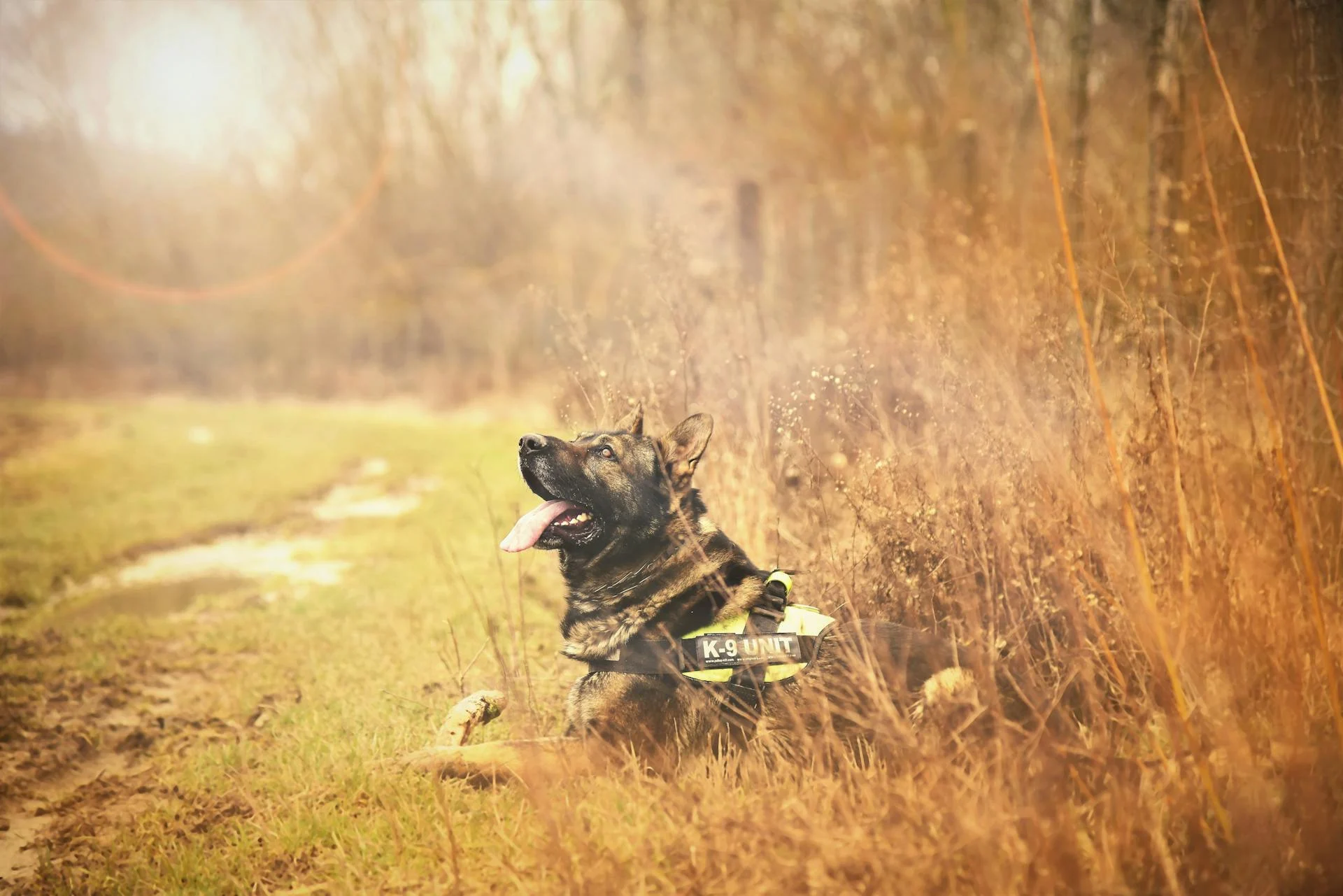
Dutch Shepherds require a lot of exercise and enrichment to prevent destructive problem behaviors.
This is because they have high energy levels and need mental stimulation to stay happy and healthy. If you're considering bringing a Dutch Shepherd into your family, make sure you can provide plenty of physical activity and engaging activities to keep them occupied.
Herding and guarding instincts can be an issue without proper guidance. This breed has a strong instinct to herd and protect, which can sometimes manifest as aggression towards people or other animals if not socialized correctly.
To minimize this risk, it's essential to work with a reputable breeder who prioritizes temperament and socialization. You should also invest time in training and socializing your Dutch Shepherd from an early age.
Shedding can be excessive. If you're sensitive to dog hair or have allergies, this might not be the best breed for you.
Here are some key cons of owning a Dutch Shepherd:
- Needs a lot of exercise and enrichment
- Herding and guarding instincts can be an issue without proper guidance
- Shedding can be excessive
Health
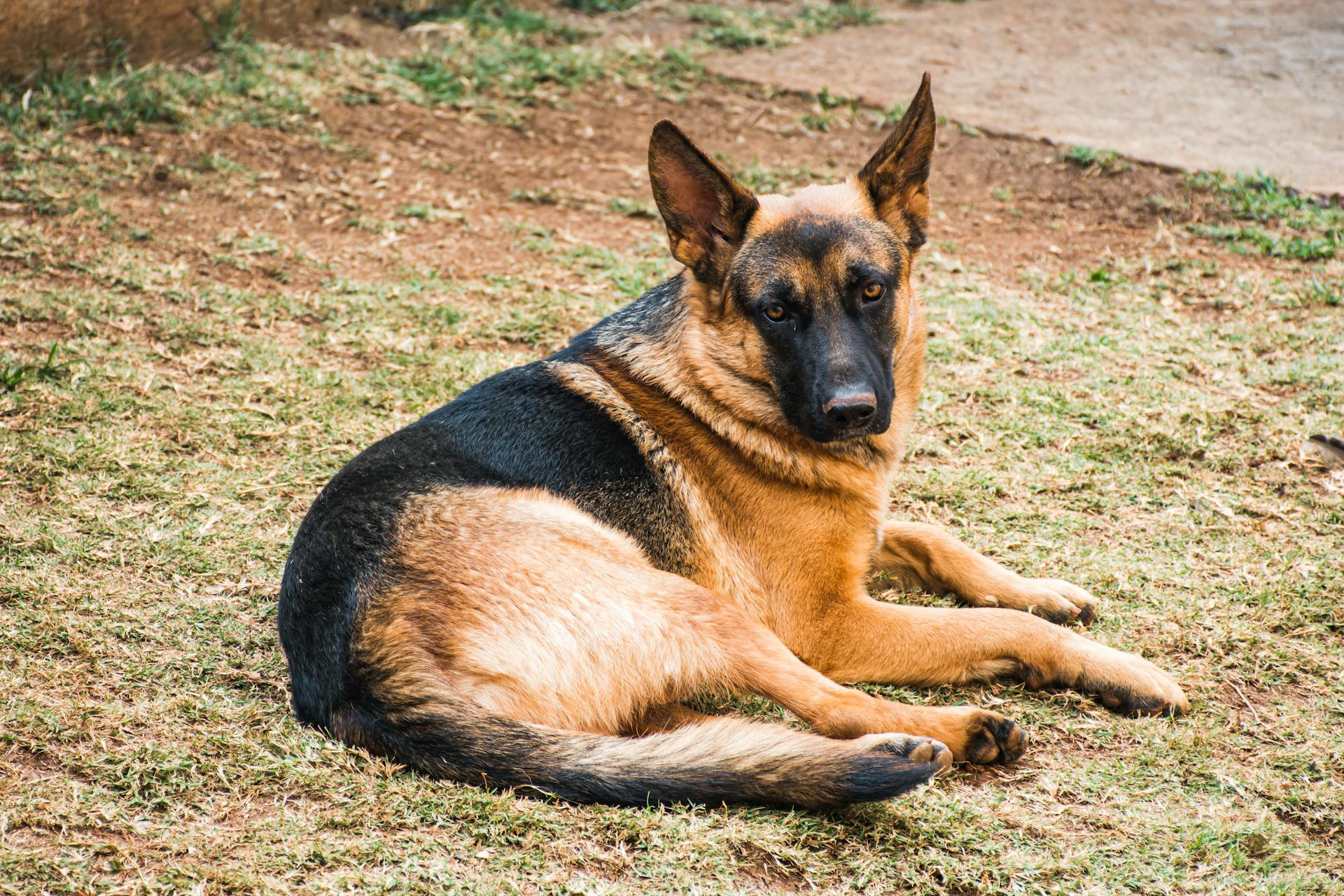
Dutch Shepherds are generally a healthy breed with an average lifespan of 11-14 years.
Genetic health problems aren't common in Dutch Shepherds, but they can occur at a low rate. Confirmed genetic diseases include allergies (atopy), masticatory myositis, pannus, cryptorchidism, and inflammatory bowel disease.
The rough-haired variety requires special care to screen for goniodysplasia before breeding, as it can cause blindness under certain circumstances. The link between genetics and goniodysplasia is uncertain, but the Dutch Breed Club regulations require testing for GD in rough-hairs.
Hip dysplasia affects around 9% of Dutch Shepherds, while elbow dysplasia affects about 5.5%. These conditions can be painful and serious, especially if left untreated.
A previously unknown inflammatory and necrotizing myopathy affecting Dutch Shepherds was genetically mapped in 2018. This disease, known as IM (Inflammatory Myopathy), causes progressive, painful inflammation of skeletal muscle tissue, often presenting between three and eight months of age.
Here are some common health issues to watch out for in Dutch Shepherds:
- Hip and Elbow Dysplasia: Affects around 9% and 5.5%, respectively
- Thyroid Conditions: Long-haired Dutch Shepherds are more susceptible to hypothyroidism, which can be treated with medication
- Goniodysplasia: Rough-haired Dutch Shepherds are at higher risk of developing this form of glaucoma
Training
Training your Dutch Shepherd requires early, appropriate, and ongoing positive training and socialization.
This breed is one of the smartest dog breeds, so they'll likely pick up your cues quickly and enjoy learning. They're also naturally inclined to be protective and territorial, which means training will help channel these instincts appropriately.
Short, active training sessions are best for this intelligent breed to keep them engaged and eager to learn. Dutch Shepherds excel at following directions and are eager to please their families.
You should be mindful of their herding instincts too - they might start to focus on herding and chasing, so be ready to ask for alternative behaviors. Daily decompression walks and enrichment activities are ideal throughout the dog's life.
Using positive reinforcement like treats, toys, and praise will make the training experience more enjoyable for everyone. As a highly trainable breed, you can teach them complex skills like jumps, scent training, and protection training.
A different take: Will Shiba Inu Coin Reach .01
Socialization is still important for these friendly dogs - getting them used to new people, other animals, and situations while they're a puppy helps bring out their friendly qualities as they grow up. Enrolling your dog in puppy school is a great way for them to learn how to play nicely with other puppies.
You might like: Are Border Collies Friendly
Buying and Owning
You can expect to pay between $1,000 to $3,500 or more for a Dutch Shepherd from a reputable breeder.
It's essential to research the breeder thoroughly and ensure they've done the necessary health screen tests on the parents. You should also see the mother and her pups together in a nurturing home environment before making a decision.
The Dutch Shepherd Dog Club of America is a great resource to start your research, and you can also consider adoption through organizations like Rescue Me! if you're interested in opening your home to a dog in need.
Recommended read: German Shorthaired Pointer Free to Good Home
Owning Essentials
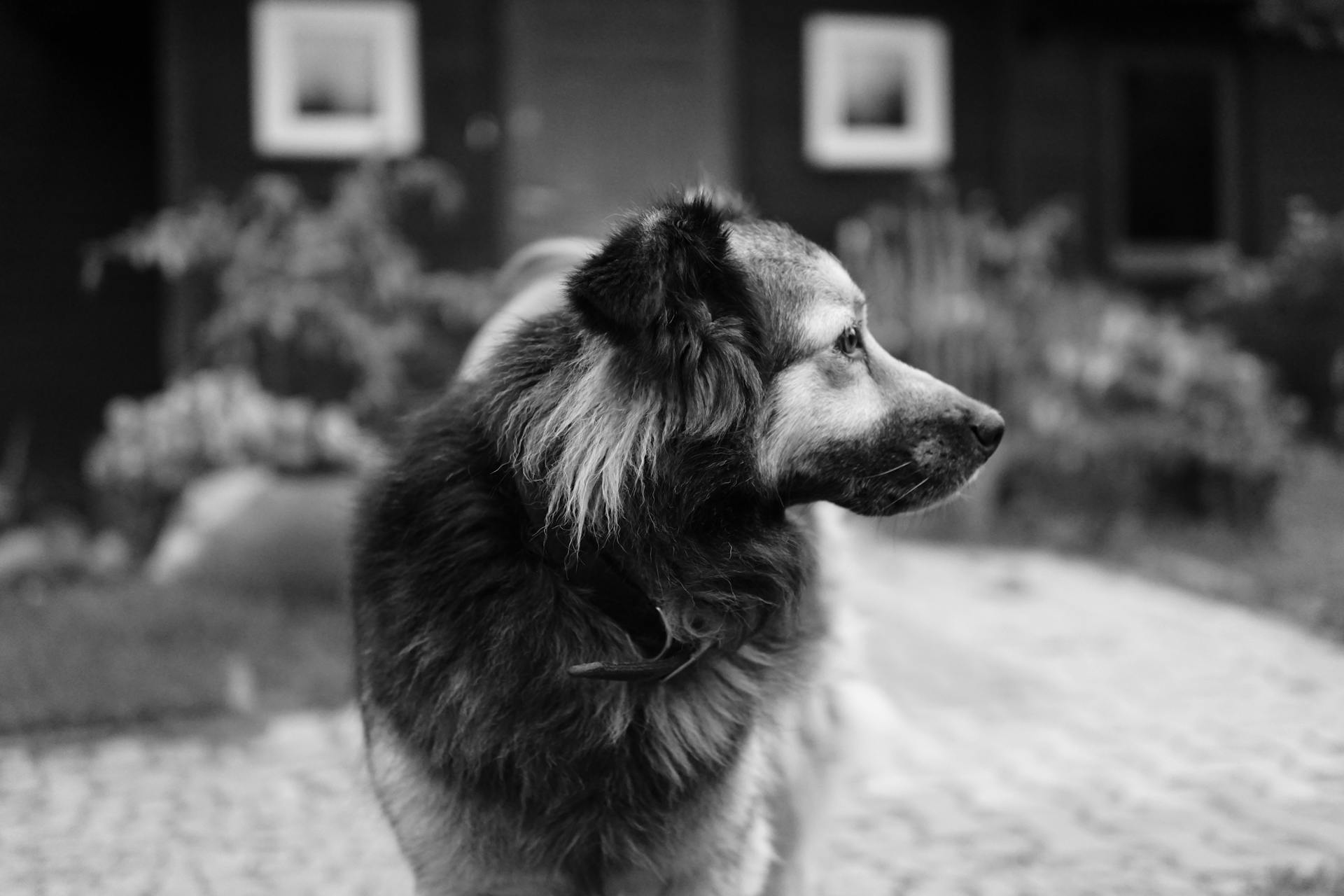
The cost of buying a Dutch shepherd from a breeder can range from $1,000 to $3,500 or more.
You'll want to research dedicated and responsible breeders who have done health screen tests on their parents and allow you to see mum and her pups together in a nurturing home environment.
Pups should not go to their new homes until they are at least eight weeks old.
Final Thoughts
Dutch Shepherds are very smart dogs that require a lot of stimulation to remain focused and well-behaved.
They can make excellent family dogs for active families who can provide them with enough physical and mental activity. If you're an active person looking to get into dog sports or competitive activities, Dutch Shepherds can be great companions.
These dogs need dedicated owners willing to put in the work to keep them happy and healthy. With proper care and attention, Dutch Shepherds can become enduring and versatile companions for many different people.
Frequently Asked Questions
Is a Dutch Shepherd the same as a Malinois?
No, a Dutch Shepherd is not the same as a Malinois. While they share similarities in size, proportion, and coat color, their origins lie in distinct gene pools that also created the German Shepherd breed.
Is a Dutch Shepherd a good family dog?
Yes, Dutch Shepherds are a great fit for active families who enjoy outdoor activities and are willing to provide regular exercise and mental stimulation. They thrive as companions in an engaged family environment.
Why are Dutch Shepherds so rare?
Dutch Shepherds were nearly driven to extinction by World War II due to a halt in dog breeding. Their rarity is largely attributed to this significant decline in population that occurred over several decades.
What is a Dutch Shepherd a mix of?
A Dutch Shepherd is believed to be a descendant of herding dogs that also created the Belgian Shepherd and German Shepherd breeds. They originated from the same stock in the southern Netherlands in the early 1800s.
Are Dutch shepherds and Belgian Malinois the same dog?
No, Dutch Shepherds and Belgian Malinois are distinct breeds with some similarities in origin and characteristics. While they share a common gene pool, differences exist in size, proportion, and coat color requirements.
Featured Images: pexels.com
